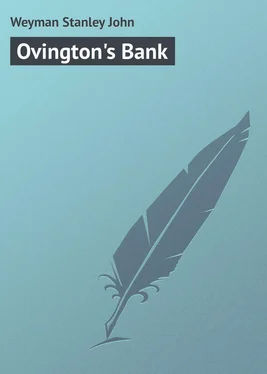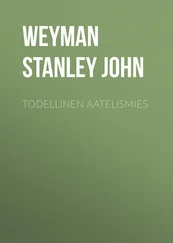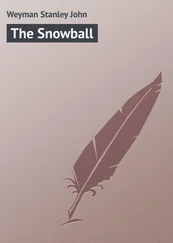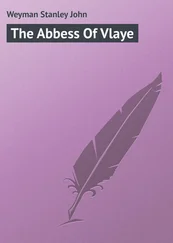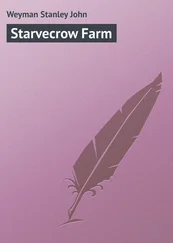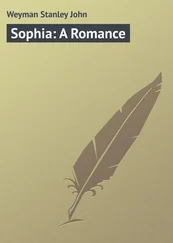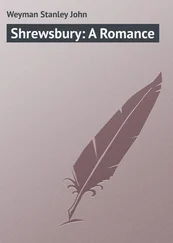Stanley Weyman - Ovington's Bank
Здесь есть возможность читать онлайн «Stanley Weyman - Ovington's Bank» — ознакомительный отрывок электронной книги совершенно бесплатно, а после прочтения отрывка купить полную версию. В некоторых случаях можно слушать аудио, скачать через торрент в формате fb2 и присутствует краткое содержание. Издательство: Иностранный паблик, Жанр: foreign_language, foreign_prose, на английском языке. Описание произведения, (предисловие) а так же отзывы посетителей доступны на портале библиотеки ЛибКат.
- Название:Ovington's Bank
- Автор:
- Издательство:Иностранный паблик
- Жанр:
- Год:неизвестен
- ISBN:нет данных
- Рейтинг книги:5 / 5. Голосов: 1
-
Избранное:Добавить в избранное
- Отзывы:
-
Ваша оценка:
- 100
- 1
- 2
- 3
- 4
- 5
Ovington's Bank: краткое содержание, описание и аннотация
Предлагаем к чтению аннотацию, описание, краткое содержание или предисловие (зависит от того, что написал сам автор книги «Ovington's Bank»). Если вы не нашли необходимую информацию о книге — напишите в комментариях, мы постараемся отыскать её.
Ovington's Bank — читать онлайн ознакомительный отрывок
Ниже представлен текст книги, разбитый по страницам. Система сохранения места последней прочитанной страницы, позволяет с удобством читать онлайн бесплатно книгу «Ovington's Bank», без необходимости каждый раз заново искать на чём Вы остановились. Поставьте закладку, и сможете в любой момент перейти на страницу, на которой закончили чтение.
Интервал:
Закладка:
"True to you!" he cried, worshipping her, adoring her. "Oh, Jos!"
"And love me a little always?"
"Love you? Oh, my darling!" The words choked him.
"It shall be as you say! It shall be always as you say!" She was clinging to him now. "I will do as you tell me! I will always-oh, but you mustn't, you mustn't," between tears and smiles, for his arms were about her now, and the poor ineffectual stile had ceased to be even an equator. "But I must tell you. I love you more now, Clement, more, more because I can trust you. You are strong and will do what is right."
"At your cost!" he cried, shaken to the depths-and he thought her the most wonderful, the bravest, the noblest woman in the world. "Ah, Jos, if I could bear it for you!"
"I will bear it," she answered. "And it will not last. And see, I am not afraid now-or only a little! I shall think of you, and it will be nothing."
Oh, but the birds were singing now and the brook was sparkling as it rippled over the shallows towards the deep pool.
Presently, "When will you tell him?" she asked; and she asked it, with scarce a quaver in her voice.
"As soon as I can. The sooner the better. This is Saturday. I will see him on Monday morning."
"But isn't that-market-day?" faintly. "Can you get away?"
"Does anything matter beside this?" he replied. "The sooner, dear, the tooth is pulled, the better. There is only, one thing I fear."
"I think you fear nothing," she rejoined, gazing at him with admiring eyes. "But what is it?"
"That someone should be before us. That someone should tell him before I do. And he should think us what we are not, Jos-cowards."
"I see," she answered thoughtfully. "Yes," with a sigh. "Then, on Monday. I shall sleep the better when it is over, even if I sleep in disgrace."
"I know," he said; and he saw with a pang that her color ebbed. But her eyes still met his and were brave, and she smiled to reassure him.
"I will not mind what comes," she whispered, "if only we are not parted."
"We shall not be parted for ever," he assured her. "If we are true to one another, not even your father can part us-in the end."
CHAPTER XI
Josina had put a brave face on the matter, but when she came down to breakfast on the Monday, the girl was almost sick with apprehension. Her hands were cold, and as she sat at table she could not raise her eyes from her plate. The habit of years is not to be overcome in an hour, and that which the girl had to face was beyond doubt formidable. She had passed out of childhood, but in that house she was still a child. She was expected to be silent, to efface herself before her elders, to have no views but their views, and no wishes that went beyond theirs. Her daily life was laid out for her, and she must conform or she would be called to heel. On love and marriage she must have no mind of her own, but must think as her father permitted. If he chose she would be her cousin's wife, if he did not choose the two would be parted. She could guess how he would treat her is she resisted his will, or even his whim, in that matter.
And now she must resist his will in a far worse case. Arthur was her cousin. But Clement? She was not supposed even to know him. Yet she must own him, she must avow her love for him, she must confess to secret meetings with him and stolen interviews. She must be prepared for looks of horror, for uplifted hands and scandalized faces, and to hear shameful things said of him; to hear him spoken of as an upstart, belonging to a class beneath her, a person with whom she ought never to have come in contact, one whom her father would not think of admitting to his table!
And through all, she who was so weak, so timid, so subject, must be firm. She must not flinch.
As she sat at table she was conscious of her pale cheeks, and trembled lest the others should notice them. She fancied that her father's face already wore an ominous gloom. "If you've orders for town," he flung at Miss Peacock as he rose, "you'll need be quick with them. I'm going in at ten."
Miss Peacock was all of a flutter. "But I thought, sir, that the Bench did not sit-"
"You'd best not think," he retorted. "Ten, I said."
That seemed to promise a blessed respite, and the color returned to Josina's cheeks. Clement could hardly arrive before eleven, and for this day she might be safe. But on the heels of relief followed reflection. The respite meant another sleepless night, another day of apprehension, more hours of fear; the girl was glad and she was sorry. The spirit warred with the flesh. She did not know what she wished.
And, after all, Clement might appear before ten. She watched the clock and watched her father and in returning suspense hung upon his movements. How he lingered, now hunting for a lost paper, now grumbling over a seed-bill, now drawing on his boots with the old horn-handled hooks which had been his father's! And the clock-how slowly it moved! It wanted eight, it wanted five, it wanted two minutes of ten. The hour struck. And still the Squire loitered outside, talking to old Fewtrell-when at any moment Clement might ride up!
The fact was that Thomas was late, and the Squire was saying what he thought of him. "Confound him, he thinks, because he's going, he can do as he likes!" he fumed. "But I'll learn him! Let me catch him in the village a week after he leaves, and I'll jail him for a vagrant! Such impudence as he gave me the other day I never heard in my life! He'll go wide of here for a character!"
"I dunno as I'd say too much to him," the old bailiff advised. "He's a queer customer, Squire, as you'd ought to have seen before now!"
"He'll find me a queer customer if he starts spouting again! Why, damme," irritably, "one might almost think you agreed with him!"
Old Fewtrell screwed up his face. "No," he said slowly, "I'm not saying as I agree with him. But there's summat in what he says, begging your pardon, Squire."
"Summat? Why, man," in astonishment, "are you tarred with the same brush?"
"You know me, master, better'n that," the old man replied. "An' I bin with you fifty years and more. But, certain sure, times is changed and we're no better for the change."
"But you get as much?"
"Mebbe in malt, but not in meal. In money, mebbe-I'm not saying a little more, master. But here's where 'tis. We'd the common before the war, and run for a cow and geese, and wood for the picking, and if a lad fancied to put up a hut on the waste 'twas five shillings a year; and a rood o' potato ground-it wasn't missed. 'Twas neither here nor there. But 'tisn't so now. Where be the common? Well, you know, Squire, laid down in wheat these twenty years, and if a lad squatted now, he'd not be long of hearing of it. We've the money, but we're not so well off. That's where 'tis."
The Squire scowled. "Well, I'm d-d!" he said. "You've been with me fifty years, and-" and then fortunately or unfortunately the curricle came round and the Squire, despising Fewtrell's hint, turned his wrath upon the groom, called him a lazy scoundrel, and cursed him up hill and down dale.
The man took it in silence, to the bailiff's surprise, but his sullen face did not augur well for the day, and when he had climbed to the back-seat-with a scramble and a grazed knee, for the Squire started the horses with no thought for him-he shook his fist at the old man's back. Fewtrell saw the gesture, and felt a vague uneasiness, for he had heard Thomas say ugly things. But then the man had been in liquor, and probably he didn't mean them.
The Squire rattled the horses down the steep drive with the confidence of one who had done the same thing a thousand times. Turning to the left a furlong beyond the gate, he made for Garthmyle where, at the bridge, he fell into the highway. He had driven a mile along this when he saw a horseman coming along the road to meet him, and he fell to wondering who it was. His sight was good at a distance, and he fancied that he had seen the young spark before, though he could not put a name to him. But he saw that he rode a good nag, and he was not surprised when the other reined up and, raising his hat, showed that he wished to speak.
Читать дальшеИнтервал:
Закладка:
Похожие книги на «Ovington's Bank»
Представляем Вашему вниманию похожие книги на «Ovington's Bank» списком для выбора. Мы отобрали схожую по названию и смыслу литературу в надежде предоставить читателям больше вариантов отыскать новые, интересные, ещё непрочитанные произведения.
Обсуждение, отзывы о книге «Ovington's Bank» и просто собственные мнения читателей. Оставьте ваши комментарии, напишите, что Вы думаете о произведении, его смысле или главных героях. Укажите что конкретно понравилось, а что нет, и почему Вы так считаете.
